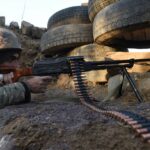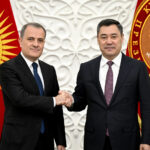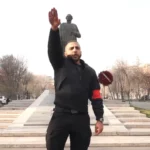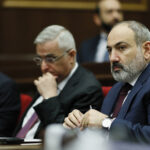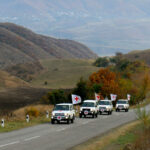Aze.Media presents an interview with social activist Adnan Huseyn, who has been involved in environmental protest on the Lachin road since day one.
Adnan, we say that there is no blockade on the Lachin road, the other side (the Armenians and their patrons) insists that there is. It is day 52 of the protest rally, and the question of whether or not there is a blockade is still a matter of dispute. Why is it so difficult for us to prove that there is no blockade? Are there no mechanisms, methods and ways to prove this simple reality?
As you said, today (February 1, 2023—Ed.) marks the 52nd day of our peaceful protest, and as of today more than 1,200 cars have already passed through the Lachin road in both directions. This is also the evidence and proof that it is inappropriate to talk about a blockade here. More than 1,200 cars do not travel along a “closed” road in 52 days under a blockade. These are vehicles that carry both civilians and humanitarian aid. Here in a single day you can see dozens of large trucks carrying civilians, food, medicine and medical supplies, small and large vehicles of the International Committee of the Red Cross, and vehicles of Russian peacekeepers driving by. There is also daily photo and video footage of this happening, meaning we have daily evidence. I also share them every day from my Twitter account, talking, explaining. Even ambulances with Armenian license plates have gone through more than once.

The only question is why the opposing side and their, as you put it, “patrons” do not want to see or accept all this. And the answer is simple: because these facts do not fit their agendas, the lies they want to convey to the world. This is why they will never accept it. The only tactic they choose today is to play on people’s feelings, the international public’s feelings without evidence, to put on a sentimental show. You know Western people get emotional about things like this. Show a picture of a crying child shivering in the cold, holding a piece of bread in his hand, or tell a heartbreaking story: this is all it takes for a Western person to melt, to sympathize with you, to believe your story, without understanding the nuances, and to emotionally attack the accused party. The Armenians know this well, too, and they use it expertly. We have to admit that.
How much longer are they going to use this trick? I mean, is there no limit to this show? How long can one fool the world with a pure show, a heartbreaking plot, and staged mise-en-scenes? Let me put it this way: I am not talking about anti-Azerbaijani, anti-Turkish circles, the patrons who are well aware of what the Armenians are trying to do, they are not interested in proof or counterarguments, because they pursue the same goals as the Armenians and are directly involved in this show. Maybe they even teach Armenians some tactical moves, although teaching Armenians to deceive is nonsense. No, I am talking about emotional, naïve, unprejudiced people who do not know the reality of the problem and are thereby susceptible to deception. How much longer will the Armenians be able to trick and deceive them?
I believe the Armenians have already exhausted their limits for deceiving this category of people. Yes, they have been able to do this so far, they have managed to paint themselves as victims, even though they have committed countless crimes over the decades. And they may have been able to continue to do so, if technological progress had not ruined everything. Technological progress is the enemy of the Armenians today. Everything is immediately recorded. Every lie is exposed very fast. This applies to the cars, cargo, food, medicine, civilians, ambulances, etc., all the things I mentioned. As soon as they go through, we film them and circulate photos and videos. The road is open, there is no blockade. Only no ammunition, mines, terrorists can come in from Armenia, and no natural resources can be taken out of Azerbaijani territory. It is as simple as that.
All right, everything is being filmed and recorded, but it is as if it does not make a difference in the long run. The noise, the shamelessness goes on and on…
We must separate the noise and the cries from the real work and the real results. The day before yesterday (January 30, 2023—Ed.) hearings were held in the International Court of Justice in The Hague at the initiative of the Armenian side. The Armenian side was the first to speak at the proceedings. They listed one by one all the accusations regarding the Lachin road, without any proofs, facts, or arguments. Their enthusiasm, their emotional eclipse of the mind went so deep that at some point they started showing pictures from 2016, 2020, which had nothing to do with our protest, and telling legends. When it was our side’s turn to speak, the scene was completely different: we saw serious, stolid, thorough, unemotional, composed people armed with ironclad evidence and irrefutable facts.

Imagine this. They say that no food or medicine is being brought into Karabakh. We show them that both food and medicine come through. They get angry, they think a little bit and say, but this food and medicine are not enough. So, we show them that the food and medicine are not in short supply, as dozens of huge trucks bring in food and medicine every day. They grimace, and what do they say? “But you cut our gas.” We say, “We didn’t cut it, we have nothing to do with those constant games of turning gas, electricity or the internet off and back on over and over again.” And so on and so forth.
The main thing is that we are not alone, the international community is following this show. When we bring up counterarguments, they change the subject and start weaving a completely different story. That is, in short, the Armenians’ Oriental self-glorification, their Bollywood-style dancing, fainting and sobbing; their emotion-filled speeches, their angry and trembling voices, their pitiful facial expressions are slowly starting to evoke not sympathy, not pity, but annoyance. A Western person, or any person in general, will inevitably, at some point, grow tired of this theater, will get suspicious. We should also focus on that now, and this is what we are doing: hey, international community, they are tugging on your heartstrings, they are showing you a spectacle, they are trying to win your sympathy, and you, by going along with them, are siding with the criminal. Because for more than two years they have committed countless illegal, criminal acts, freely using the Lachin road. They have been destroying our nature, our resources, smuggling our wealth to Armenia; and they have been bringing mines and weapons into Azerbaijan illegally, inflicting harm on our civilians. As if it was not enough that Armenian militants and terrorists entered our territory from Armenia, they also brought provocateurs and agents to Karabakh from Iran.
That is, we must open people’s eyes by presenting all this to the world in the right way, with facts, evidence, arguments, without emotion. This is what we are doing now.
I hear you. Far be it from me to act as a doubting skeptic, and what you say makes a lot of sense too, but, after 52 days, your evidence that the Lachin road is not closed, that the Red Cross, Russian peacekeepers, Armenian ambulances are passing through it, has not worked either. The opposite side is not satisfied with it. So the question arises: what else should be able to go through, how and where, for this not to be called a blockade? Can any vehicle coming from or going to Armenia get through unhindered? Is it realistic for an Armenian to come to Khankendi or go to Armenia in his/her own car?
Indeed, the opposing side is not satisfied with vehicles of Red Cross, Russian peacekeepers, and Armenian ambulances. They say that any number and type of cars, any type of people should be allowed to go through as they used to. If only Red Cross and peacekeeper vehicles use the road, it means there is a blockade on the road, through which only special vehicles are allowed. This is not true at all, because if we look at the map, the Lachin road is a 65-70 km long road from the border with Armenia to Khankendi. There are about five or six posts of the Russian peacekeepers on the 50-kilometer stretch from the border with Armenia to where we are standing, that is, to the protest site. And from where we are, 13-15 kilometers down the road to Khankendi, there are at least two Russian posts. So we are talking about a total of seven to eight posts.

Now, get this. During our entire stay here, that is, since day one, we have not seen any civilian vehicle from Armenia approaching us, passing through our site. However, from day one both we and our state said that civilians could use this road, there would be no obstacles for them. But they do not come here. The photo, video and other facts we have give us grounds to say that Armenians who want to come from Armenia or want to go to Armenia are either stopped and not allowed through by their own police officers or, even if they are allowed through, they are stopped and returned by the Russians. This means that even if someone blocks their way and does not allow them through, it is not us.
The only fact that could prove that we, i.e. the Azerbaijanis, are obstructing the movement of Armenians, could be that we did not let them into Khankendi or Armenia. And we never even had the opportunity to do that. The Armenians should first give us such an opportunity to see whether we let them through, whether we stop them from going through or not. Isn’t that logical?
If you allow me, I would like to ask you about the elderly Armenian man who showed up at your protest site. Who was he, what did he want, and most importantly, how did he get there? After all, you say that Armenians who want to travel from Armenia to Karabakh and back are first stopped by their own police, and if they let them through, the Russians stop them…
Yes, that elderly Armenian said that he got lost and ended up at our site. I mean, this is his own version. It is not impossible that, as a local resident, he knows hidden and alternative routes. Apparently, that is how he got here. For us, the most important thing is that he came to us, asking us for help. You must agree that what matters is not how or where he came from, but what he wanted from us.
What did he want from you? What were his specific demands and wishes?
He said he was hungry, wanted a smoke and was sick, that he had a cold. We immediately gave him food, our medical volunteers examined him, gave him medicine, we also gave him two cartons of cigarettes, several bags of food and sent him on his way. He got into the Russian peacekeepers’ car and drove off, completely free and safe.

Actually, I must mention that from day one we shared phone numbers, for Armenians who wanted to get through or contact us about anything, so that they could call, meet, talk, or secure their passage. But so far there has been no call. We have said repeatedly that our problem is not with civilians, we have no problem with them, they can go through. But even though they have this option, they either resort or are forced to resort to more convoluted, more bizarre and ridiculous methods. For example, they call the Red Cross cars, saying that they have critically ill people, that there are no conditions to treat them in Khankendi, that they need treatment in Armenia. So, the information comes in that a terminally ill patient is going to be transported. When the vehicle approaches and drives by us, we see that the terminally ill patient is not only not lying down, the patient is sitting like a healthy person, chatting on the phone, talking, joking, etc. We have yet to see a person on their last breath in a Red Cross vehicle. They could at least pretend to be sick, but they do not even do that.
By the way, there were also images circulating of a bus full of Armenian teenagers. Was this bus going from Armenia to Khankendi? If so, which of the Azerbaijanis stopped it and checked it, and how and for what purpose was the video taken?
On the evening of January 18 at around 11 o’clock, this bus suddenly showed up on the Lachin road. We were not informed in advance who was coming, who was on the bus, it was just let through the Armenian-Azerbaijani border and through the checkpoints of the Russian peacekeepers. If you ask me, I think that the sudden appearance of this bus pursued provocative goals: they hoped that we would not let the bus through, that we would cause trouble for the passengers. And they would film it, circulate it around the world. When the bus pulled up at our protest site, we asked who the passengers were, they answered that these were teenagers returning from Armenia to Khankendi, to their parents. And we, of course, said they could go through.
Now, about that video. Only one person, a journalist, went inside with his camera and shot a 20-30 second video. I was standing on the foot of the bus, in the doorway, and saw everything, heard everything. When the journalist saw that there were teenagers on the bus, he wanted to share with them the candy he had in his pocket and his fruit juice. After the children refused, the journalist stepped out, the doors closed, and the bus continued on toward Khankendi.
So, if it all took so little time, if there were no problems, why and how did the Armenian side make such a fuss about it?
That is the point. Before the bus reached Khankendi, the opposing side was already spreading fake news that the bus carrying the children had been attacked by armed Azerbaijanis in black masks and black clothes, who shouted at the children, harrassed them, insulted them, and one of them even allegedly wanted to rape an underage girl. Then, allegedly, when the peacekeepers who were watching from outside saw this, they immediately went inside, kicked the Azerbaijanis out, the driver quickly took off, but the Azerbaijanis were shouting and swearing after the bus, and the children were frightened, one of them even fainted.
They go that far in their fabrications?
Yes, as hard as it is to believe, but this is exactly how far they go. Once again, one journalist with a camera films for a maximum of 30 seconds without even getting on the bus all the way, offers candy to the children, gets out, the bus takes off, and then the mess described above plays out, and this slander starts to spread.
But what would have happened if the journalist had not gotten on the bus, that is, if there had been no contact, if the bus had not even stopped there? You have to agree that if even one second of contact resulted in such lies, slander, and brazenness, then maybe the contact should never have happened in the first place.
I cannot agree with that. First, I realize that the story about “children harassed on the bus” can be perceived as a sensitive and disturbing issue, especially by Western audiences. That was the plan. But a child is a child and cannot have a nationality, an ideology. And it never occurred to any of us to harass a child.
That is not the point here. What matters to us is that we have evidence of the incident, this short video. They have no proof. We talk with facts, and they tell tales. They are used to people believing unconditionally everything they say. But that was not the case this time. If you noticed, they did not put much emphasis on the incident themselves, they quickly dropped it, they did not even mention it at the proceedings in The Hague. Do you know why? Because by filming it, we disrupted their plans. As I said, the goal was to provoke us. And we, with a short video made by one journalist, prevented the spread of their shameless and disgusting lies, such as “black masks”, “attempts to insult and abuse children”, “peacekeepers entered the bus and kicked the Azerbaijanis out”, “a child fainted”. The video fact cut the life of this fiction short.
We insured ourselves with a 30-second video, and this is what counts. This short video shows that the children on the bus are safe and sound, no one is bothering them, and the bus is on its way to Khankendi. And all Armenian fabrications have not the slightest plausibility and value.
After Secretary of State Anthony Blinken called Ilham Aliyev and asked him to open the road, the Armenians were very hopeful that this time the road would definitely be opened, because Aliyev would not be able to say no to Blinken. Although it has been nine days since Blinken called, the campaign continues. And now there is frustration on the Armenian ranks, they are asking who else should call Aliyev for the road to be opened. After whose call do you think the road would open?
No one’s. Because this protest is not being held by the state, it is not a state-run campaign. Our protest is organized by representatives of NGOs, our civilians. We are not breaking any international or local laws or rules, everything is within the legal framework, so no one can put pressure on us and give us orders. Blinken may want a lot of things, but there is little the President can do for him in this matter: as I said, the state has nothing to do with this campaign. And the fact that our being here has led to some kind of humanitarian disaster, I repeat, is an invention of the Armenians. We stand on our land, we protest within our legally recognized rights, we are not blocking any roads and we are not bothering anyone. We also trust our state and know that it will not take away our rights just because some Blinken says so. We have openly stated that we do not and will not accept environmental terrorism within our country, and we are here until we have accomplished our goal.

Armenians and their patrons refer to you as “so-called environmentalists”. What education, what courses and certificates/diplomas does one need to show concern about the environmental situation and to organize protests? What else does a person need to worry about the environment? What would you say to those who make accusations against you?
We are used to accusations, there is nothing new here. We ignore it all and go about our business. Of course, one does not have to be a certified environmentalist to be concerned about the environmental situation, and the expression “so-called environmentalists” is not only absurd, but also disrespectful and ignorant. Everyone can and should be concerned about the environment. I am not a professional, certified environmentalist myself. Since one of the missions of the re:Azerbaijan project, which I represent, is to inform citizens about environmental issues, I decided to participate in the campaign from day one and came here. Pollution, poisoning of our rivers and soils is not only our problem, it is a problem of the entire region, even of the entire world. That is why anyone who has at least some sincerity and sense gets to the heart of our protest, studies the facts presented by us, examines the situation on the ground, and only then decides whether our protest, our demands are justified or not.

